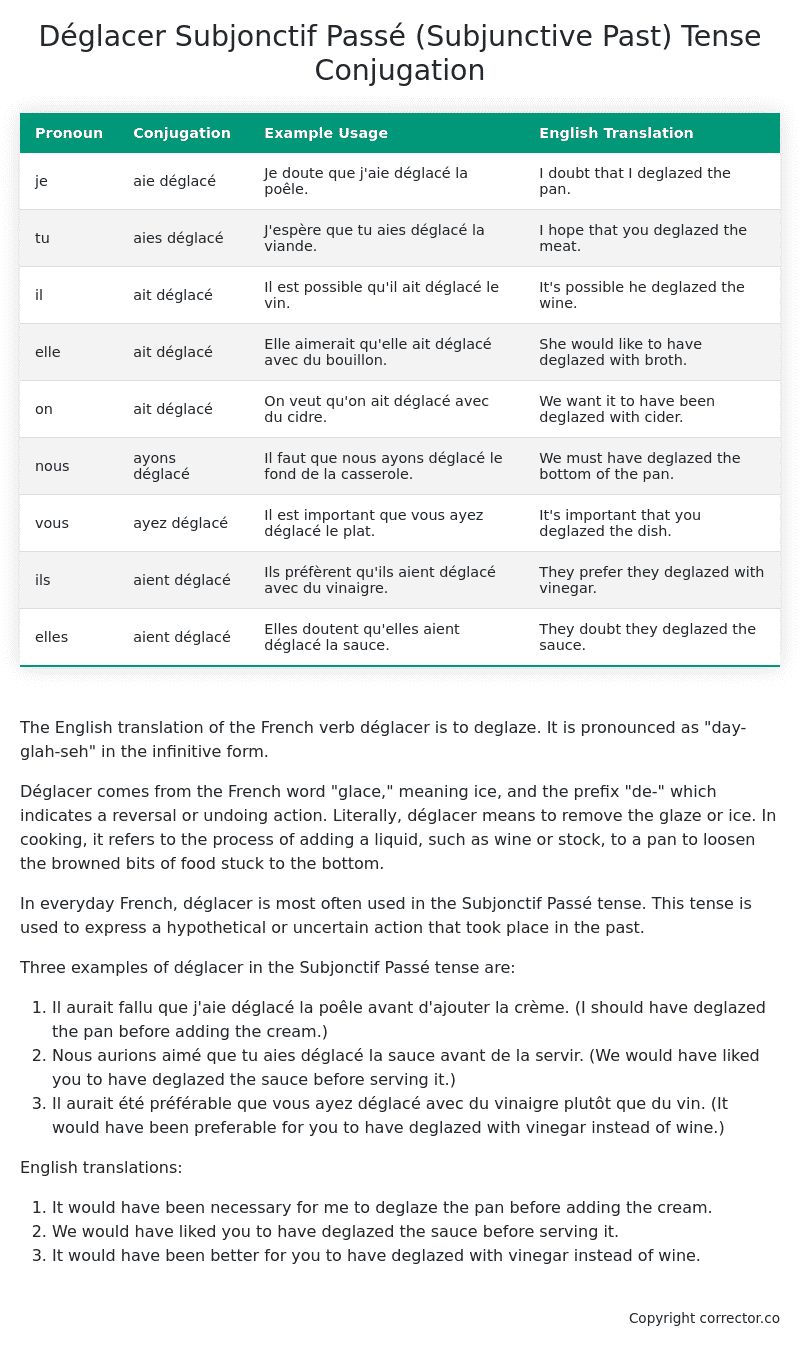Subjonctif Passé (Subjunctive Past) Tense Conjugation of the French Verb déglacer
Introduction to the verb déglacer
The English translation of the French verb déglacer is to deglaze. It is pronounced as “day-glah-seh” in the infinitive form.
Déglacer comes from the French word “glace,” meaning ice, and the prefix “de-” which indicates a reversal or undoing action. Literally, déglacer means to remove the glaze or ice. In cooking, it refers to the process of adding a liquid, such as wine or stock, to a pan to loosen the browned bits of food stuck to the bottom.
In everyday French, déglacer is most often used in the Subjonctif Passé tense. This tense is used to express a hypothetical or uncertain action that took place in the past.
Three examples of déglacer in the Subjonctif Passé tense are:
- Il aurait fallu que j’aie déglacé la poêle avant d’ajouter la crème. (I should have deglazed the pan before adding the cream.)
- Nous aurions aimé que tu aies déglacé la sauce avant de la servir. (We would have liked you to have deglazed the sauce before serving it.)
- Il aurait été préférable que vous ayez déglacé avec du vinaigre plutôt que du vin. (It would have been preferable for you to have deglazed with vinegar instead of wine.)
English translations:
- It would have been necessary for me to deglaze the pan before adding the cream.
- We would have liked you to have deglazed the sauce before serving it.
- It would have been better for you to have deglazed with vinegar instead of wine.
Table of the Subjonctif Passé (Subjunctive Past) Tense Conjugation of déglacer
| Pronoun | Conjugation | Example Usage | English Translation |
|---|---|---|---|
| je | aie déglacé | Je doute que j’aie déglacé la poêle. | I doubt that I deglazed the pan. |
| tu | aies déglacé | J’espère que tu aies déglacé la viande. | I hope that you deglazed the meat. |
| il | ait déglacé | Il est possible qu’il ait déglacé le vin. | It’s possible he deglazed the wine. |
| elle | ait déglacé | Elle aimerait qu’elle ait déglacé avec du bouillon. | She would like to have deglazed with broth. |
| on | ait déglacé | On veut qu’on ait déglacé avec du cidre. | We want it to have been deglazed with cider. |
| nous | ayons déglacé | Il faut que nous ayons déglacé le fond de la casserole. | We must have deglazed the bottom of the pan. |
| vous | ayez déglacé | Il est important que vous ayez déglacé le plat. | It’s important that you deglazed the dish. |
| ils | aient déglacé | Ils préfèrent qu’ils aient déglacé avec du vinaigre. | They prefer they deglazed with vinegar. |
| elles | aient déglacé | Elles doutent qu’elles aient déglacé la sauce. | They doubt they deglazed the sauce. |
Other Conjugations for Déglacer.
Le Present (Present Tense) Conjugation of the French Verb déglacer
Imparfait (Imperfect) Tense Conjugation of the French Verb déglacer
Passé Simple (Simple Past) Tense Conjugation of the French Verb déglacer
Passé Composé (Present Perfect) Tense Conjugation of the French Verb déglacer
Futur Simple (Simple Future) Tense Conjugation of the French Verb déglacer
Futur Proche (Near Future) Tense Conjugation of the French Verb déglacer
Plus-que-parfait (Pluperfect) Tense Conjugation of the French Verb déglacer
Passé Antérieur (Past Anterior) Tense Conjugation of the French Verb déglacer
Futur Antérieur (Future Anterior) Tense Conjugation of the French Verb déglacer
Subjonctif Présent (Subjunctive Present) Tense Conjugation of the French Verb déglacer
Subjonctif Passé (Subjunctive Past) Tense Conjugation of the French Verb déglacer (this article)
Subjonctif Imparfait (Subjunctive Imperfect) Tense Conjugation of the French Verb déglacer
Subjonctif Plus-que-parfait (Subjunctive Pluperfect) Tense Conjugation of the French Verb déglacer
Conditionnel Présent (Conditional Present) Tense Conjugation of the French Verb déglacer
Conditionnel Passé (Conditional Past) Tense Conjugation of the French Verb déglacer
L’impératif Présent (Imperative Present) Tense Conjugation of the French Verb déglacer
L’infinitif Présent (Infinitive Present) Tense Conjugation of the French Verb déglacer
Struggling with French verbs or the language in general? Why not use our free French Grammar Checker – no registration required!
Get a FREE Download Study Sheet of this Conjugation 🔥
Simply right click the image below, click “save image” and get your free reference for the déglacer Subjonctif Passé tense conjugation!

Déglacer – About the French Subjonctif Passé (Subjunctive Past) Tense
Formation of the Subjonctif Passé
Everyday Usage Patterns
Interactions with Other Tenses
Present tense
Future tense
Conditional
Summary
I hope you enjoyed this article on the verb déglacer. Still in a learning mood? Check out another TOTALLY random French verb conjugation!


